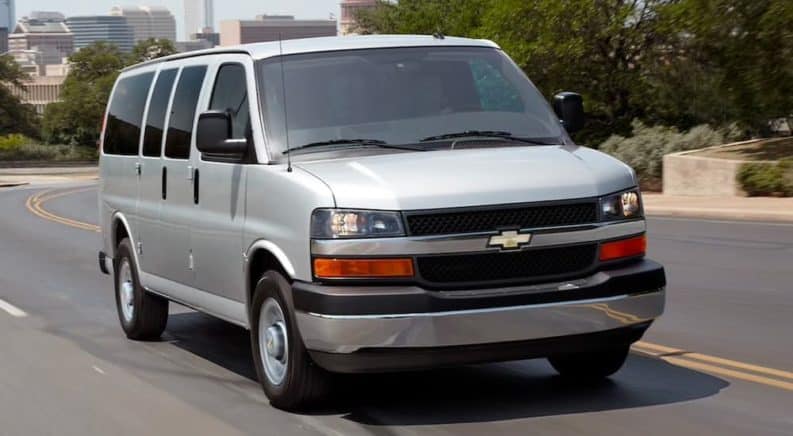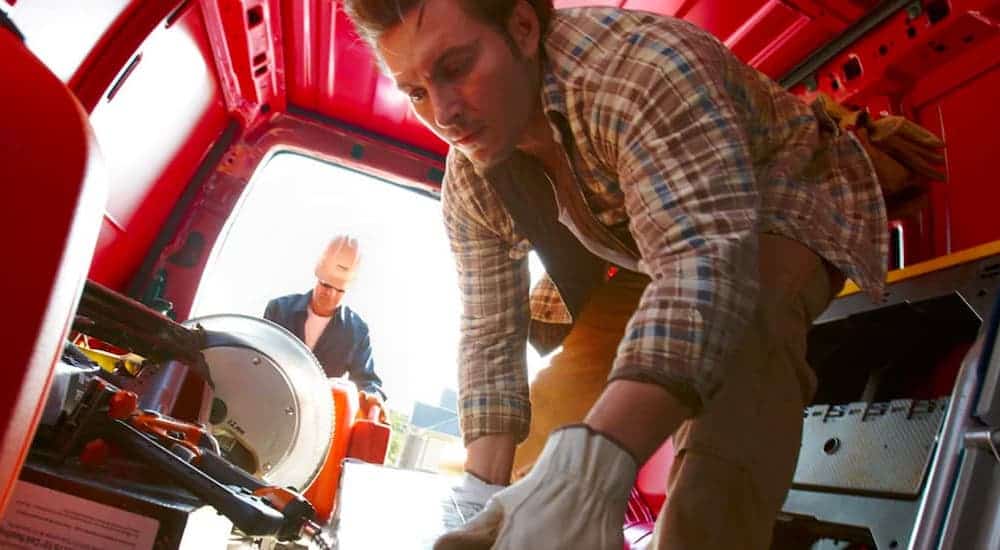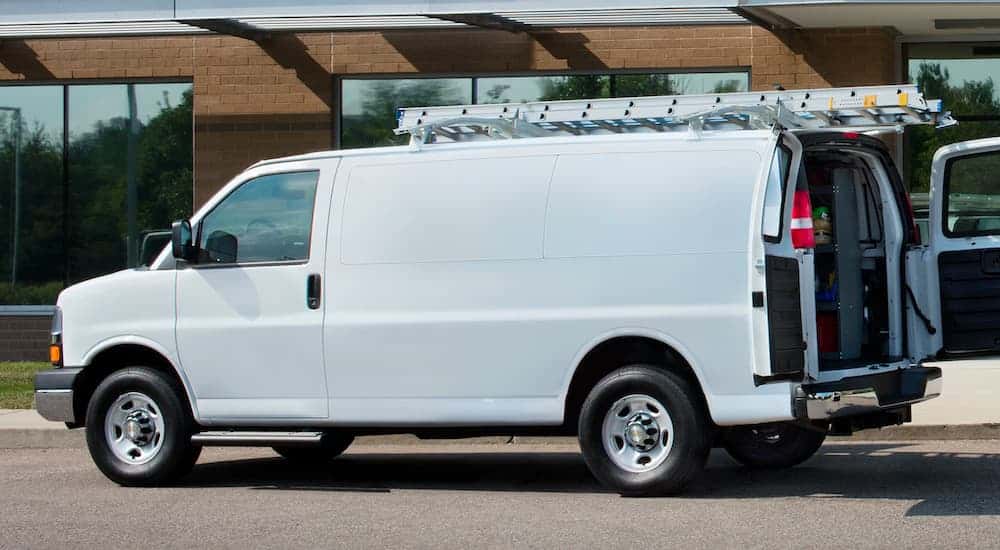The 2021 Chevy Express Van has 1,001 uses that you can take full advantage of. Do you want a mobile office for your contracting business? Check. Prefer a 15-seat capacity shuttle van? No problem. The list of conversion opportunities for the versatile Express Van is nearly endless. We’ve seen just about every iteration, but not until recently have we recognized that it makes a pretty sweet living space, too.
Living in a van? Isn’t there a Saturday Night Live skit about that involving Chris Farley and a river? Well, yes, but today’s version of van life doesn’t include it choosing you because you have nowhere else to go. Today, van living is an alternative lifestyle that’s slowly making its way into the mainstream, thanks to the growing trend of remote work and a long list of social media influencers that make it look cool.
What role does the bare-bones 2021 Chevy Express Van play in all of this? It’s actually one of the more popular conversion van choices touted by van living experts, thanks to its low price tag, a wide array of chassis options, and capable engine options. The Express Van comes in several sizes and configurations, making it accessible even to buyers with skimpy budgets. The 2021 lineup of Express Cargo vans starts at just $32,500 for a regular wheelbase 2500 model. The larger, higher capacity 3500 Express Cargo van with a regular wheelbase starts at only $35,600. Both models are available in different wheelbase lengths, which we’ll cover later.
Are you ready to try your hand at van life? If so, the 2021 Chevy Express van is the best option for conversion into your new living space. Here we look at the attributes that lend it to a van-as-home build-out, including performance, safety features, and fuel economy. It’s a true transformation from a cargo van to apartment-on-wheels, but the Express Van is the ultimate blank canvas, giving buyers room to dream and build it out as they choose.
Performance and Capability for Your Travels
The least romantic part of buying a conversion van is understanding its capabilities. This step – the step of acquiring a basic understanding of the van’s mechanical features – is critical for optimal safety and knowledge-based ownership. Luckily, the new 2021 Chevy Express Van is pretty straightforward and comes with a factory warranty that covers the most expensive components.
The Express Van is offered in two sizes – the 2500 and the 3500 – with three different engines. The 2.8-liter four-cylinder Duramax Turbo-Diesel is available on the Express 2500 and Express 3500. It delivers a respectable 181 horsepower and a powerful torque output of 369 lb-ft, which gives it a maximum towing capacity of 7,000 lbs, just in case you’re hauling a toy trailer.
Next up, the 4.3-liter V6 pumps out 276 horsepower and 298 lb-ft of torque, offering a max towing capacity of 7,400 lbs. The engine’s direct injection and Variable Valve Timing technology mean better overall fuel economy and a smoother ride. It’s a great mid-priced option for a little extra highway power and additional trailering capacity.
The largest and most powerful engine is Chevy’s rugged 6.6-liter V8. With performance numbers of 401 horsepower and 464 lb-ft of torque, this beast can haul up to 10,000 pounds. It also includes direct injection and Variable Valve Timing to maximize performance and fuel efficiency and is also paired with a special six-speed heavy-duty automatic transmission. So, these engines have the power to tow and get you moving, but how much can they hold?
Size Options to Build the Perfect Living Space
The Express 2500 is the smaller of the two Express Van options, with two wheelbase options: a 135-inch and a 155-inch. The 2500 has a max 16,000 lbs Gross Combination Weight Rating (GCWR), which means the combined weight of the van, its contents, and whatever it trailers cannot exceed 16,000 lbs. The 2500 van’s Gross Vehicle Weight Rating (GVWR) measures the max weight it can handle within the van itself (including the weight of the van). For the 2500, GVWR is 8,600 pounds. In the rear, the Express 2500 cargo van can handle up to 3,280 lbs of cargo capacity, which means there is plenty of weight capacity available for adding cabinets, bedding, and plumbing systems.
The Express 3500 offers greater capacities at the same overall size. The 135-inch and 155-inch wheelbases are identical to the smaller 2500, as is the GCWR, which comes in also at 16,000 pounds max. Where it differs is GVWR. The 3500 GVWR is upped to a maximum of 9,900 lbs, which includes a payload capacity (remember, this is how much your van’s contents can weigh) of up to 4,280 pounds.
All of these size specifications are for the Express Cargo Van. While there is a passenger van alternative in both 2500 and 3500 sizes, conversion customers looking to upfit the van for living won’t want the included seating, so we’ve left it out of this review. Remember to check the specifications for the van you are looking at, as these numbers can vary depending on the van’s configuration.
Safety to Protect You
Since you’re likely going to spend thousands of hours racking up mileage on highways and backroads, reviewing your van’s safety features and equipment is an important ‘pre-flight checklist’ item that some buyers overlook. Again, it’s not too romantic, but safety is integral, especially during long, boring stretches of highway driving when drivers tend to lose focus.
The 2021 Chevy Express Van lineup is fully-equipped with a whole host of standard and available safety features, all designed to keep occupants and cargo safe from harm in all driving conditions. Starting with the standard rear vision camera that displays an image on the rearview mirror of the area directly behind the van, these systems are designed to maximize visibility and minimize collisions. Also standard is a tire pressure monitoring system that alerts the driver if tire pressure dips below acceptable levels. This feature has the added benefit of extending the lifetime of your tires because maintaining proper tire pressure helps tires last a lot longer and wear more evenly.
Chevy also offers optional driver-assist technology designed to act as a virtual co-pilot by continuously monitoring road conditions around the vehicle. Through the use of strategically-located sensors and cameras, these systems alert the driver to potential hazards and automatically assist with accident avoidance. Systems like side blind zone alert detect vehicles entering your van’s blind zone, so you don’t attempt to change lanes unsafely. Forward collision alert detects a potential front-end collision and alerts the driver. The system also mitigates tailgating by sending an alert when the driver follows the car ahead too closely.
Chevy Has Your Back
We especially like Chevy’s extensive warranty coverage that’s supported by a vast nationwide dealer network ready to help with repairs and original factory replacement parts. New Chevy Express van buyers will enjoy a 3-year/36,000-mile limited warranty, along with a 5-year/60,000-mile powertrain warranty. Chevy also throws in complimentary maintenance for the first year or the first visit (restrictions apply).
Overall, the Chevy Express Cargo van is a solid and dependable option for van dwellers looking for a spacious, safe, and capable template on which to build the roving home of their dreams. Take your bare-bones commercial van to one of dozens of special conversion experts, and you’ll be on the road to adventure before you know it. Or, take on the challenge to renovate your dream van for yourself. Either way, the 2021 Chevy Express Van is the best place to start your van life journey.






